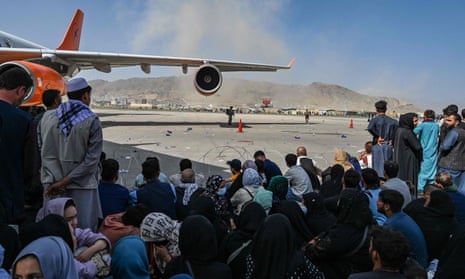The fall of Kabul has reopened divisions over immigration in European countries as government leaders brace themselves for an inevitable surge in refugees.
Thousands of Afghans, among them the president, Ashraf Ghani, rushed to the airport in Kabul in an attempt to flee Afghanistan after the Taliban took control of the capital. Three people are reported to have died in the chaos at the airport.
Leaders of Albania and Kosovo said on Sunday they had accepted an American request to temporarily host political refugees seeking entry to the US.
It comes amid concerns that Nato members are not responding quickly enough to evacuate Afghan citizens who are in danger of reprisals from the Taliban.
Albania, a country of 4.2 million in south-eastern Europe, is taking in hundreds of refugees.
“I am devastated to see people left behind and want to give them at least the possibility to breathe again,” the country’s prime minister, Edi Rama, told the Guardian. “We know what it’s like to live under a dictatorship and what it’s like to be a foreigner seeking shelter somewhere. It’s about who we are; it’s an honour and a duty to do this.”
Rama said he could not understand “how richer countries can turn their backs”.
“This clashes with the values we all preach,” he added. “Albania can’t solve the problem but we also don’t want to be part of it.”
About 30,000 Afghan citizens have left the country each day for the past 10 days, the majority travelling to Iran or Pakistan by land.
“With the uncertainty and instability in Afghanistan it is clear that there will be an exodus and western countries need to act quickly,” said Christopher Hein, a professor of law and immigration policies at Luiss University in Rome.
The Italian prime minister, Mario Draghi, said on Monday that “Italy is committed to protecting Afghan citizens who have collaborated with our mission”, and the country “is working with European partners for a solution to the crisis which protects human rights, especially those of women”.
About 100 Italian nationals and embassy staff were evacuated from Kabul on Sunday night, arriving at Fiumicino airport, Rome, on Monday afternoon. There were also several Afghan citizens who had collaborated with Italian forces onboard. “The Taliban is searching for people house to house. There are thousands whose lives are at risk,” an Afghan medic told the Italian press.
Luigi Di Maio, Italy’s foreign minister, told Corriere della Sera on Sunday the priority was evacuating Italian citizens, but that “we cannot think of abandoning the Afghan people after 20 years”.
Luciana Lamorgese, Italy’s interior minister, said the country was planning to evacuate Afghan interpreters and medical staff who had assisted the Italian forces. “We will do everything to make sure they arrive in Italy safely,” she said.
With the far-right League being a key partner in Draghi’s broad coalition government, it remains to be seen if Italy will succeed in accepting more Afghan citizens. Matteo Salvini, the leader of the party, who blocked migrant rescue ships during his 14-month stint as interior minister, tweeted: “In Kabul, after the cowardly flight of western countries, the flag of Islamic cut-throats and Taliban killers returns. Terrorism, violence, fear and illegal immigration are on the horizon.”
France’s defence minister, Florence Parly, said on Monday the country would first evacuate its nationals and then Afghan colleagues from Kabul to a base in Dubai.
“We are planning to carry out the first rotation between now and the end of this Monday,” Parly said, adding the evacuees were French nationals who remained in Kabul “but also people under our protection”.
Major German newspapers and broadcasters have urged the chancellor, Angela Merkel, to implement an emergency visa programme to take in Afghan journalists who worked for them over the past 20 years. “The lives of these freelance staff are now in acute danger,” the dpa news agency said.
Austria said on Sunday it would continue its policy of deporting rejected Afghan asylum seekers. The country was among six EU states that last week insisted their right to expel failed Afghan asylum seekers should be maintained.
Three of these countries – Denmark, Germany and the Netherlands – have since changed course, saying they would suspend deportations. France has also suspended deportations of rejected Afghan asylum seekers.
Austria’s interior minister, Karl Nehammer, described banning deportations as “a pull factor for illegal migration which only fuels the inconsiderate and cynical business of smugglers and organised crime”.
He added: “Those who need protection must receive it in a country that is closest to their country of origin. As minister of the interior, I am primarily responsible for the people living in Austria. Above all, this means protecting social peace and the welfare state over the long term.”
A survey by the Austrian newspaper Osterreich showed 90% of Austrians supported their government’s tough stance.
EU countries fear a repeat of 2015 and early 2016, when more than 1 million migrants, mostly from Syria but also Afghanistan and Iraq, arrived in Europe, sparking political turbulence within member states and across the bloc. The response was to make deals with Turkey and Libya to stem the flow.
“But now they need to open their eyes and take responsibility,” said Hein. “They need to quickly organise for Afghan citizens – including many women who collaborated with European countries in Afghanistan – to be airlifted out as soon as possible.”
